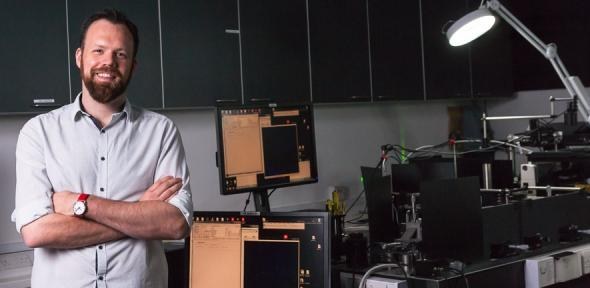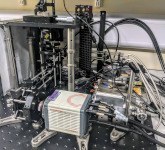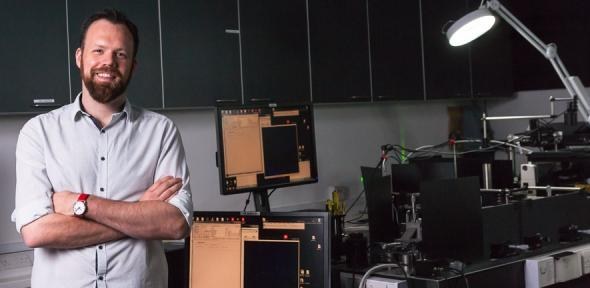
Cambridge researchers build the world's first 3D imaging cytometer and cell sorter: Zomp.
Cambridge Professor, Steven Lee, believes that one day ‘to Zomp’ will mean to carry out high-volume, three-dimensional imaging of individual cells.
Zomp is a new company co-founded by Professor Lee and his colleagues at University of Cambridge, Dr Kevin O’Holleran and Gillies Kleboe. Zomp is developing the world’s first 3D imaging flow cytometer, a medical device that counts cells. Cytometers are used in laboratories around the world and are essential to many areas including immunotherapy, drug discovery and cancer diagnosis.
Innovative technology
Zomp’s innovative technology combines the ability of a flow cytometer to make fast, high volume cell measurements, with the 3D imaging capability of a microscope. “Our goal is to image single cells at subcellular resolution with the high definition of a microscope, but with the speed and capacity of a cytometer – something which has not yet been done,” explains Lee.
“The innovation is in the ability to collect large volumes of data very quickly while retaining high quality data.”
Some existing flow cytometers do provide two-dimensional images, but these flat images can only capture individual slices of a cell, without giving the full picture. “A cell is quite complicated. With 2D imaging you can’t tell how big the cell really is, or what shape the nucleus is, for example,” says Lee. “Our instrument can image entire cells, on a scale 100 times more sensitive than other imaging cytometers.”

IMAGE: The revolutionary Zomp 3D imaging flow cytometer
The instrument works by firing cells with fluorescent markings through a series of microfluidic channels, patented under the name ‘Lightgate.’ Multiple images are taken from different angles, similar to a CT scan. Next, in a process called deconvolution, the images are recombined to form one complete image.
Potential applications
The instrument has many potential applications, although the initial focus will be on drug discovery. “Researchers test new drugs using target validation. They need ways to clearly measure how their drug is affecting the targeted area of a cell. This instrument will provide a much clearer picture at a much higher speed than has been possible before,” says Lee.
The team have developed a functioning prototype which can quickly generate large volumes of data, although the eventual goal is to build a machine which measures cells at the rate of one thousand per second. Future seed funding will allow Zomp to hire new employees to further develop the instrument and marketing opportunities.
PhD research at the backbone
Working within the research team, supervised by Professors Lee and O’Holleran, PhD student Alexander Collins was co-inventor on the patent for the new instrument. Alexander said, “It's been hugely rewarding being part of this project - from building the first working optical system prototypes, through analysis of the construction pipeline, to realisation of a design that formed the backbone of subsequent expansions of the system’s capability. Now, at the end of my PhD, we have a fully-functional high-speed 3D imaging system. It will be exciting to explore its potential and see where it goes next!"
Just Zomp it!
Why Zomp? The team wanted a name that could eventually become a verb, like ‘Google’ or ‘Shazam.’ So, with dedication, perseverance, and luck, future researchers who need complex imaging of a high quantity of cells might be saying: “Just Zomp it!”

IMAGE: Professor Steven Lee, Zomp co-founder and CEPS CDT supervisor
Published: March 2023
Images: © courtesy of University of Cambridge.
Read the full article here: https://www.ch.cam.ac.uk/news/need-high-volume-3d-imaging-just-zomp-it
Photos: Prof Steven Lee, Dr Kevin O'Holleran, student Alexander Collins.
Professor Steven Lee is Professor of Biophysical Chemistry at University of Cambridge, Founder & CEO ZOMP and supervises PhD and MRes students on the IPES and CEPS CDT.
Dr Kevin O'Holleran is a physicist at University of Cambridge, Co-founder of ZOMP and supervises PhD and MRes students on the IPES and CEPS CDT.
Alexander Collins is a PhD researcher at University of Cambridge, funded by EPSRC Centre for Doctoral Training in Integrated Photonic and Electronic Systems (IPES CDT) (programme grant EP/L015455/1). Alex was part of the team of researchers, and co-inventor, on of ZOMP.



